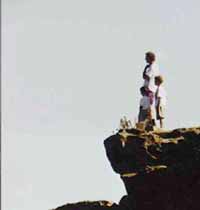Parenting for an Age of Information: 
Preparing Your Daughter or Son
for the Next Century
by Jamie McKenzie, Ed.D.
Chapter 1 - Inventing
The sandbox is not what it used to be - neither is the back yard, the family room or the school down the street. Raising a son or daughter in these times calls for parents with skill, humor and inventiveness.
We must raise a generation which has embraced a change ethic. They will thrive on change, considering it an opportunity to stretch out into the future and grow. Flexibility and problem solving can replace the GNP as the new indicators of growth for our society. Parents can equip their children to make the most of school and life experiences. Specific strategies:
1. Play "What if . . . " games with your children.
2. Model the spirit of inventiveness.
3. Nurture your child's imagination.
4. Encourage selective television-viewing.
5. Reward responsible risk-taking.
Chapter 2 - Questioning
One can never know all of the right answers, especially in a world of rapidly changing information. However, with proper training, one can usually fashion the right questions to get to the answers. Questions are tools of thinking that can be modified and molded to fit shifting situations.
2. Make your child's life as wonder-full as possible.
3. Guard against excessive routine.
4. Admit you do not have all the answers.
5. Collect and relish puzzles.
6. Encourage optimism, faith and the benefit of the doubt.
Chapter 3 - Puzzling
We live in a puzzling world. It is almost as if someone shakes up the puzzle pieces on a daily or weekly basis, strewing the fragments out across the world's living room floor to see if we can make sense out of all the seemingly disconnected pieces. Puzzling out the meaning of life - bringing order to chaos - is a major part of our life's work, and showing our children how to manage the often confusing process is a major responsibility of parenting. Good puzzling skills produce insight, the capacity to discern the true nature of a situation. The good puzzler can penetrate the fog, the confusion, the distortion, the mountains of data and the propaganda of modern life to catch an elucidating glimpse of reality. Specific strategies:
1. Fill the Toy Chest with Puzzles
3. Introduce Games of Strategy
4. Emphasize Observation, Recording and Interpretation
5. Model the Crow's Nest Perspective
Chapter 4 - Choosing
Learning to "look before you leap."
Thoughtful decisions require a careful review of options. As part of a problem-solving and decision-making framework, children can learn to generate multiple solutions and possibilities. They then test them out before making a decision to see which is best. In this way they avoid stumbling through life impulsively and haphazardly. They look ahead to assess the likely consequences of various choices.
1. Give your child more than a single choice
2. Develop the skill of compare-and-contrast
3. Shop around
4. Use role-playing to test consequences
5. Bring your child into the voting booth
6. Develop a family decision-making council
Acknowledgment
These chapters were originally drafted by me as part of a larger book which was to be published with a co-author, Hilarie B. Davis, Ed.D. Much of the thinking contained in these chapters was strongly influenced by conversations held with her during those times and some of these passages were expertly edited and changed by her.
©1991 JMcKenzie